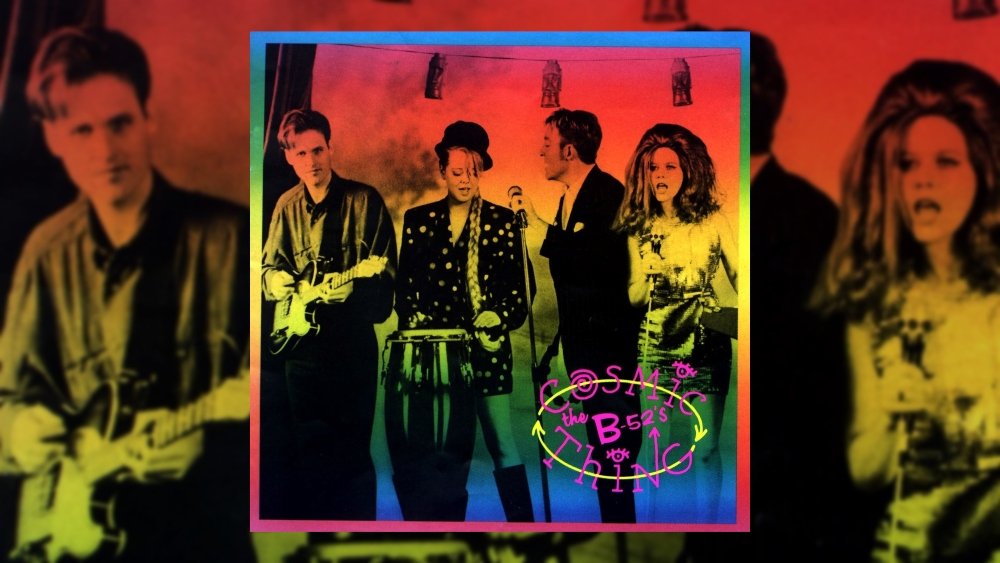Happy 35th Anniversary to The B-52s’ fifth studio album Cosmic Thing, originally released June 27, 1989.
Transformative.
It’s not often that one could honestly say that something, especially an album, has had a “transformative” effect on them. So much so that in my four-and-a-half decades of existence, I think there are but a handful of albums that could honestly lay claim to this qualifier. Cosmic Thing by The B-52s is most definitely one of them.
Revisiting this album has brought back so many memories, primarily the coming of age ones and we all know that music most definitely plays not only an integral part of who, what, where and when in our lives, but it can also be an educator and inspiration for what lies ahead. It’s hard to believe that thirty-five years have passed since The B-52s’ fifth album took the world by storm, and it’s even harder to imagine that the album itself very nearly wasn’t made.
The songs on Cosmic Thing were a slight move away from the band’s previous four albums which had been perceived as more underground “new wave.” Their 1979 eponymous debut album was a hit, particularly in Australia where it achieved the #3 spot on the charts along with all three singles achieving similar success. Both "Rock Lobster" and “Planet Claire" have become some of music’s most legendary songs in their own right and have also gone on to forever be synonymous with the band and the new wave era they epitomized throughout the ‘80s.
The band’s following three albums did moderately well, with many claiming that their sophomore LP Wild Planet (1980) is their best. Whammy! (1983) and Bouncing Off The Satellites (1986) did not go on to achieve the same success as the previous two and maybe because of this, the band felt the need in the making of the latter album to write separately and switch up instruments (Keith Strickland moved from drums to guitar and keyboard). Sadly, these disruptions were trivial in comparison to the tragedy that struck the band in the most extreme way possible when Ricky Wilson, their guitarist and lead vocalist Cindy Wilson’s brother, passed away from an AIDS related illness in late 1985. It sent the band into shock.
Watch the Official Videos:
Bouncing Off The Satellites had not yet been completed and given the devastation felt by all band members, the album was not promoted and the band wisely took a much needed hiatus. It’s important to mention Wilson’s death here for a number of reasons; not only was he a founding member of The B-52s and a prophetic guitarist giving the band an incredibly unique sound, but he was also a gay man who had passed away from an AIDS related illness at the height of his career. In 1985, this was not only incredibly taboo and surrounded by prejudice, but it could have very well been the catalyst for the band’s demise. Thankfully it wasn’t and given that June is Pride month, one must pay homage to yet another musician and person who sadly lost their life to HIV/AIDS.
1988 saw the band reunite after nearly three years away from the recording studio and start writing collaboratively, with all remaining four band members having songwriting credits on all four lead singles from the album. In June 1989, the album’s third single “Love Shack” was released and whilst the two preceding singles “Cosmic Thing” (from the soundtrack Earth Girls Are Easy) and "Channel Z” had provided little buzz for the band, it was their foray into the more commercial and incredibly upbeat party anthem that reaffirmed that they were well and truly back.
“Love Shack” is undoubtedly the band’s most recognizable song on a global scale and given that it charted incredibly well worldwide, with a staggering eight weeks at #1 in Australia, this album was so much more than just a comeback. It was the first time the band had played without Ricky Wilson and to achieve all this success must have been somewhat bittersweet. Sometimes when we are at our lowest, we dig the deepest for inspiration and this album is living proof of that.
The album’s fourth and fifth singles, “Roam” and "Deadbeat Club," went on to chart well, with “Roam” faring better and gaining a GRAMMY nomination. “Deadbeat Club” was a homage to the band’s early life when their parents constantly referred to them as “Deadbeats” and even featured a cameo from their fellow Athenian, R.E.M.’s Michael Stipe, in the music video. Other notable tracks on the album are the beautifully upbeat “Junebug” and the transcendental, instrumental closing track “Follow Your Bliss.”
Cosmic Thing had a lot riding on its back, but with a production team that included Don Was (Was Not Was) and the legendary Nile Rodgers of Chic fame, coupled with a regrouping of sorts by the band, the album went on to become the group’s most commercially successful venture to date. Whilst many said the band had become “too commercial,” Cosmic Thing most definitely stayed true to their core style of new wave, continuing with the infusion of surf music (most notably with “Follow Your Bliss”) and their own unique brand of upbeat, lyrically positive and infectious dance grooves (think “Love Shack,” "Roam” & “Topaz”).
This album meant so much to so many at the time, an ushering in of a welcome frivolity that had been absent in music for so long. Fun, slightly cheesy and over-the-top was how many would aptly describe The B-52s. But it is the true story behind this album, a story of loss and heartbreak, coupled with a lull in their popularity that meant Cosmic Thing was now as good a time as any to take a risk, let their proverbial hair down and preserve Ricky Wilson’s vision. And boy did their risk reap rewards that endure to this day.
LISTEN:
Editor's note: this anniversary tribute was originally published in 2019 and has since been edited for accuracy and timeliness.

